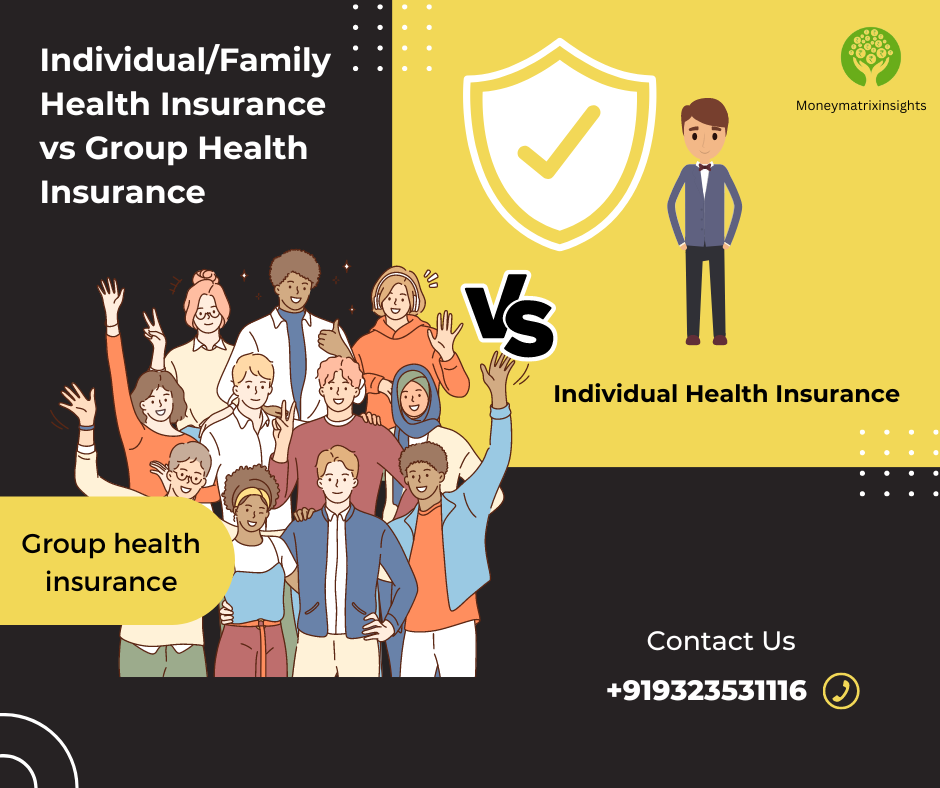These days, purchasing health insurance is one of our top priorities. However, most people don’t think to purchase an individual health plan if they currently have group health insurance when it comes to making the purchase. Although these two kinds of plans might provide comparable coverage, they are not the same. Learn the distinctions between individual and group health insurance in this blog And group insurance plans.
Individual/Family Health Insurance: What Is It?
An individual or family health insurance policy covers only the medical costs of the policyholder and their family members. Individuals and families alike can acquire this policy, with the buyer assuming the role of the policyholder to whom the insurance policy is issued.

Group health insurance: what is it?
Medical costs incurred by a group of people are covered by a group health insurance policy. Employers, cooperative societies, or other groups typically purchase this kind of health insurance coverage for their staff members or members. All of the group’s members are eligible for coverage even though the policy is issued to the employer or group secretary.
Individual/Family Health Insurance vs group insurance plans
To learn the differences between individual and group health insurance plans, refer to the following table:
| Categories | Individual Health Insurance | Group Health Insurance |
| Offers coverage | To an individual/family | To a group of people |
| Who Can Buy? | One individual or for Family Members | Employers, groups, cooperative societies |
| Who is Insured? | Policyholder & their family members | Group members and their family members |
| Eligibility Criteria | Must be 18 years and above (Children can be covered if the parent(s) is covered with the same insurer) | Must be a permanent employee of the company or permanent member of the group |
| Sum Insured | High sum insured options available (Can choose as per needs) | Low sum insured options available (no option to choose, decided by an employer) |
| Pre-policy Medical Check-up | May be required (especially in the case of senior citizens or person having any Pre-existing diseases) | Not required |
| No Claim Bonus | Available | Not available |
| Pre-existing Diseases Coverage | Covered after a waiting period of 2 to 4 years | Covered from day 1 (if opted by an Employer) |
| Coverage for Parents | Available as per requirements & budget | Depends upon the Employer’s budget |
| Maternity Benefit | May or may not be available | Available (if opted by an Employer) |
| Critical Illness Cover | Available if opted by the policyholder | Not available |
| Add-on Riders | Available | Not available |
| Tax Benefit | Available u/s 80D | Not available |
| Measure of control | Full control by the policyholder to enhance/reduce coverage | Limited control is available with the insured as the coverage is decided by the employer |
| Personalization | Can be customized to suit the policyholder’s medical needs | Not possible |
| Adaptability to Compare | Full flexibility to compare different insurers and choose a plan of choice | No freedom to choose the insurer as it is chosen by the employer |
| Premium Payment | Paid by the policyholder | Paid by the employer |
| Claims | Claims can be raised directly with the insurer/TPA | Claims may have to be raised with a TPA |
| Exit Criteria | Most plans come with lifetime renewability | Policy ceases to exist when the employee leaves the company |
Briefly stated
There are more differences than similarities between group health insurance and individual/family health insurance. Address a person’s specific health needs with one, while the other caters to the medical requirements of a group as a whole.
- Family floater Health Insurance meaning : A Complete Guide
- Star health insurance with maternity coverage no waiting period
- Star Health Reimbursement Form – Step-by-Step Guide to Claim Process
- Star Health Insurance Pre-Authorization Form: Download & Complete Guide
- what is Irda exam ? Complete Guide for 2025

